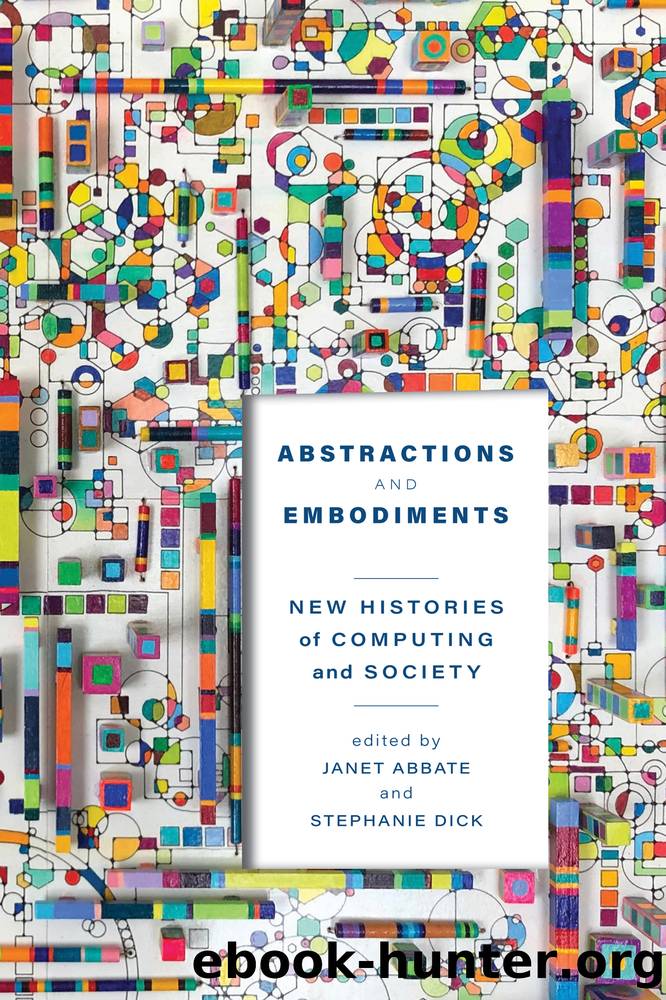Abstractions and Embodiments by Janet Abbate

Author:Janet Abbate
Language: eng
Format: epub
Publisher: Johns Hopkins University Press
Published: 2022-08-15T00:00:00+00:00
Notes
1. Joy Lisi Rankin, A Peopleâs History of Computing in the United States (Cambridge, MA: Harvard University Press, 2018), 2.
2. Erkki Huhtamo, âSlots of Fun, Slots of Trouble: An Archaeology of Arcade Gaming,â in Handbook of Computer Game Studies, ed. Joost Raessens and Jeffrey H. Goldstein (Cambridge, MA: MIT Press, 2005), 4.
3. Laine Nooney, âThe Uncredited: Work, Women, and the Making of the U.S. Computer Game Industry,â Feminist Media Histories 6, no. 1 (January 1, 2020): 119â46, doi:10.1525/fmh.2020.6.1.119.
4. Jaakko Suominen, âHow to Present the History of Digital Games: Enthusiast, Emancipatory, Genealogical, and Pathological Approaches,â Games and Culture 12, no. 6 (June 20, 2016): 551, doi:10.1177/1555412016653341.
5. Research for this chapter was supported by Charles University project PRIMUS/21/HUM/005âDeveloping Theories and Methods for Game Industry Research, Applied to the Czech Case.
6. Merriam-Webster, âClone,â Merriam-Webster.com dictionary, March 29, 2020, https://www.merriam-webster.com/dictionary/clone.
7. Ivan da Costa Marques, âCloning Computers: From Rights of Possession to Rights of Creation,â Science as Culture 14, no. 2 (June 2005): 139, doi:10.1080/09505430500110887.
8. Marques, âCloning Computers,â 148.
9. Eden Medina, Cybernetic Revolutionaries: Technology and Politics in Allendeâs Chile (Cambridge, MA: MIT Press, 2011); Benjamin Peters, How Not to Network a Nation: The Uneasy History of the Soviet Internet (Cambridge, MA: MIT Press, 2016); Maria B. Garda, âMicrocomputing Revolution in the Polish Peopleâs Republic in the 1980s,â in New Media Behind the Iron Curtain: Cultural History of Video, Microcomputers and Satellite Television in Communist Poland, ed. Piotr Sitarski, Maria B. Garda, and Krzysztof Jajko (Åódź: Åódź University Press; Kraków: Jagiellonian University Press, 2020), 111â70.
10. Jaroslav Å velch, Gaming the Iron Curtain: How Teenagers and Amateurs in Communist Czechoslovakia Claimed the Medium of Computer Games, Game Histories (Cambridge, MA: MIT Press, 2018).
11. The search was conducted on March 4, 2020, on the Annals website, and initially yielded 55 results. I removed wrong hits and editorial material such as issue introductions. Interviews and practitioner recollections are included in the corpus.
12. In some cases, it is difficult to distinguish between the cloning of hardware and software. âCloning Macintosh,â for example, can mean both cloning the hardware and cloning the operating system and the system ROM.
13. Ling-Fei Lin, âDesign Engineering or Factory Capability? Building Laptop Contract Manufacturing in Taiwan,â IEEE Annals of the History of Computing 38, no. 2 (April 2016): 22â39, doi:10.1109/MAHC.2015.73; Honghong Tinn, âFrom DIY Computers to Illegal Copies: The Controversy over Tinkering with Microcomputers in Taiwan, 1980â1984,â IEEE Annals of the History of Computing 33, no. 2 (February 2011): 75â88, doi:10.1109/MAHC.2011.38; Zbigniew Stachniak, âRed Clones: The Soviet Computer Hobby Movements of the 1980s,â IEEE Annals of the History of Computing 37, no. 1 (January 2015): 12â23, doi:10.1109/MAHC.2015.11.
14. James W. Cortada, IBM: The Rise and Fall and Reinvention of a Global Icon, History of Computing (Cambridge, MA: MIT Press, 2019).
15. Petri Saarikoski and Jaakko Suominen, âComputer Hobbyists and the Gaming Industry in Finland,â IEEE Annals of the History of Computing 31, no. 3 (2009): 20â33, doi:10.1109/MAHC.2009.39.
16. Marques, âCloning Computers.â
17. Tinn, âFrom DIY Computers to Illegal Copies.â
18. Gonzalo Frasca, âUruguay,â in Video Games Around the World, ed. Mark J. P.
Download
This site does not store any files on its server. We only index and link to content provided by other sites. Please contact the content providers to delete copyright contents if any and email us, we'll remove relevant links or contents immediately.
Management Strategies for the Cloud Revolution: How Cloud Computing Is Transforming Business and Why You Can't Afford to Be Left Behind by Charles Babcock(4130)
Ego Is the Enemy by Ryan Holiday(3991)
Offensive Shellcode from Scratch by Rishalin Pillay(3665)
Exploring Deepfakes by Bryan Lyon and Matt Tora(3250)
Robo-Advisor with Python by Aki Ranin(3027)
Learning C# by Developing Games with Unity 2021 by Harrison Ferrone(2871)
Speed Up Your Python with Rust by Maxwell Flitton(2849)
Liar's Poker by Michael Lewis(2810)
Agile Security Operations by Hinne Hettema(2804)
Linux Command Line and Shell Scripting Techniques by Vedran Dakic and Jasmin Redzepagic(2803)
OPNsense Beginner to Professional by Julio Cesar Bueno de Camargo(2802)
Extreme DAX by Michiel Rozema & Henk Vlootman(2790)
Essential Cryptography for JavaScript Developers by Alessandro Segala(2740)
Elevating React Web Development with Gatsby by Samuel Larsen-Disney(2729)
Python for ArcGIS Pro by Silas Toms Bill Parker(2644)
AI-Powered Commerce by Andy Pandharikar & Frederik Bussler(2642)
Cryptography Algorithms by Massimo Bertaccini(2627)
Incident Response Techniques for Ransomware Attacks by Oleg Skulkin(2626)
Distributed .NET with Microsoft Orleans by Bhupesh Guptha Muthiyalu Suneel Kumar Kunani(2625)
